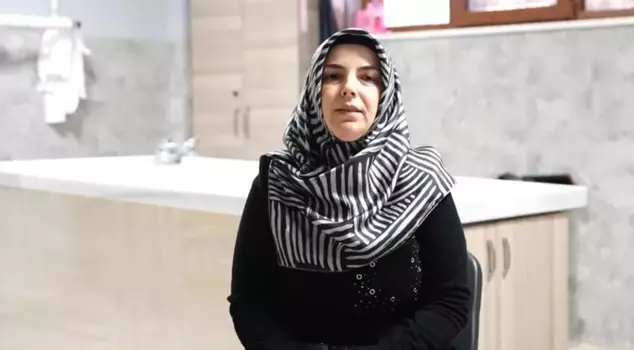
06.01.2025 14:10
Nagihan Yılmaz, who has been working as a mortician for 11 years, answered the question "Do you have a memory that you can't forget?" by saying, "They brought an aunt in a coffin. When we took her to the funeral home, the room was filled with the scent of roses. I will never forget that day; in my 11 years of professional life, I have never encountered a funeral like that again."
Recently, following the highly popular "Gassal" series broadcasted on TRT's digital platform Tabii, the gassals working in the Düzce Municipality Cemetery Affairs Directorate shared their curiosities about their profession and unforgettable memories.
After the phenomenon "Gassal" series, the Düzce Municipality Press-Publication and Public Relations Directorate met with the gassals working in the cemetery affairs department to convey the questions that piqued public interest. While sharing their interesting memories and the challenges of their profession, the gassals emphasized the perceptions of this profession in society and the difficulties they face. Gassals Nagihan Yılmaz, Gülistan Uğur, İsmail Çelebi, and Oktay Sevinç shared many of their experiences, from how they chose their profession to their most challenging moments.
"IT IS A RELIGIOUS DUTY FOR US"
The gassals pointed out that the work they do is a fundamental need for every person, stating, "For us, washing a deceased person is a religious duty. We perform our work meticulously to fulfill our last duty to the deceased in the best way possible. If Allah has granted us this duty, it is a requirement of our faith to carry it out in the best way."
The gassals expressed that they sometimes received negative reactions from the people they shared their profession with, stating that it was upsetting for them when their meals were not eaten or their offerings were rejected.
THEY EXPERIENCED EMOTIONAL MOMENTS
While emphasizing that they perform their profession on a voluntary basis, the gassals experienced emotional moments while sharing some unforgettable memories. They stated that they not only wash the deceased but also provide comfort to the bereaved, saying, "We know that the spirit of the deceased is spiritually with us. We take on an important role for the bereaved, inviting them to fulfill the last duty of their mother or father."
"IN MY 11 YEARS OF PROFESSIONAL LIFE..."
Nagihan Yılmaz, who stated that a single question influenced her decision to choose the profession of gassal, said, "When one of my relatives passed away, I asked myself who would wash them. Actually, this question directed me to this profession. While studying at Imam Hatip, we also took lessons on this subject, and our teacher chose me. I believe this job was my destiny." She also shared an unforgettable memory from the early years of her profession: "They brought an aunt in a coffin. When we took her to the mortuary, the room was filled with the scent of roses. I will never forget that day; in my 11 years of professional life, I have never encountered such a funeral again."
"I WAS NOT AFFECTED WHEN I WAS SINGLE"
İsmail Çelebi, who has been practicing the profession for a long time, expressed that the sadness he felt increased over time, saying, "When I started this job, I was single, I was more composed, and I looked at it as a profession; I was not affected. However, especially child funerals affect me a lot. Now that I have a child, I imagine my own child in that situation, and it makes me very sad. May Allah never put anyone in the position of having to wash their child."
The gassals added that they perform their work with great care and love, and they expect this profession to be appreciated more in society.